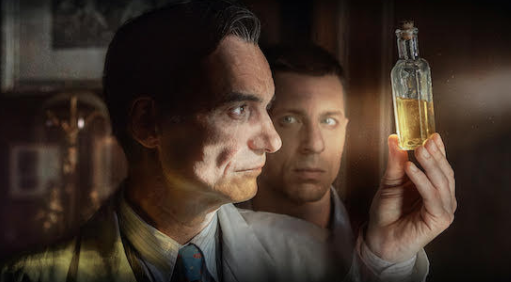Coverage from the 56th annual Chicago Film Festival running October 14 - 25.

by Nick Taylor
It takes a while for Charlatan, the newest film by Agnieszka Holland and the Czech Republic’s Oscar submission for Best International Feature this year, to get its feet under itself. The semi-fictionalized story of renowned Czech herbalist and healer Jan Mikolášek (played by Ivan Trojan for most of the film and by Josef Trojan, his son, as a young man), Charlatan opens with the death of president Antonín Zápotocký in 1957. With his biggest political ally and former patient gone, Mikolášek is warned to flee the Czech Republic before he's arrested by the Communist party. He refuses, either because he’s too bullishly stubborn or too self-flagellating, and is soon arraigned with his assistant František Palko (Juraj Loj) on death penalty-level charges that his lawyer proves are a sham with little investigation. The party doesn’t if the case is strong, or even real, as long as he’s executed.
The film jumps between this scenario and following Mikolášek’s beginnings as a soldier in World War I, his training with a local herbalist named Mülbacherová (Jaroslava Pokorná), and the formation of his practice with František. Charlatan delineating these timelines with a color tint heavy enough to satisfy anyone who found the dual threads in Little Women difficult to track...
Its formal elements are never its strongest asset, especially regarding some odd musical cues, but its choices are solid and easy to grasp.
Holland aims to create a complex portrait of Mikolášek, even as she conspicuously elides certain parts of his life in favor of her own contributions. His bonafides as a medical practitioner are quickly established and rarely challenged. His ex-wife is entirely absent, while his fictionalized romance with František dominates much of the story once he arrives. Their tenderness is quite moving, even as Mikolášek makes an unthinkably cruel request of František in a fit of jealousy. Charlatan constantly juxtaposes these seemingly contradictory traits in Mikolášek without going all “how can we grapple with the depths of this great man?!” about it - it’s sincerely interested in seeing these different sides of him. How might we understand his goodness alongside his inexplicable bouts of violence and barely-repressed melancholy? What do we make of a man who healed hundreds of impoverished patients a day with someone who was almost executed for regularly treating members of Hitler’s cabinet?
And, we must ask, why does the government want him gone so badly? Is he a threat to the Communist party? Is it the gay thing? Something else? Charlatan never resolves this, nor does it cohere any final portrait of Mikolášek himself. It doesn’t even show his ultimate fate, ending on a quote of Mikolášek’s after his trial is disrupted.
The film feels as though it’s building towards a conclusion that never arrives, toeing a line between ambiguity and incompleteness. Like the man it’s about, Charlatan is more dimensional than we first expect, but it’s hard to know what to make of it by the end.

Grade: C+
Oscar chances: If the Academy is compelled by Jan Mikolášek’s story and Agnieszka Holland’s track record in the category it might have a shot. Still, I don’t think it’s formally or thematically skilled enough to really compete.